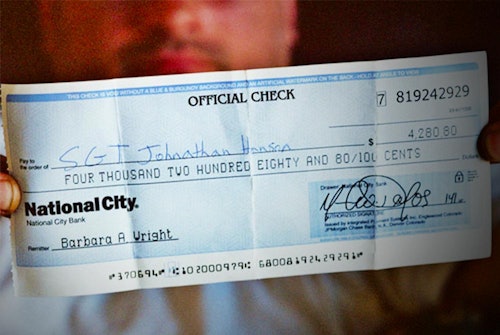- Do I Need to Get a Car History Report?
- What's Included in a Car History Report
- Why Is a Vehicle History Report Important?
- How To Get A Car's History
- How Checking a Car's History Can Save You Time and Money
A vehicle history report is a document you can order that shows you a detailed history of the car, from previous accidents to how many owners it has had. When you're considering buying a second-hand car, it's an important document (and definitely worth the small price tag) as the current owner may not disclose everything you should know.
Do I Need to Get a Car History Report?
While it isn't mandatory that you get a vehicle history report before buying a car, it's highly recommended and a vital part of the vehicle purchasing process.
Buying or leasing a car can be stressful, and a car history report can help you make a more informed financial decision. By getting all the information you can about a vehicle, you can avoid the pitfalls that cost car buyers extra time and money.
With a car history report, you can:
- Find the true value of a vehicle
- Get a history of past owners
- See what accidents the car has been in
- Find out if there are any potential issues that require repair
What's Included in a Car History Report
A car history report will provide you with several key pieces of information about a vehicle. These include:
- Accident history
- Title information
- Vehicle liens
- Previous owners
- Recall notices
- Service history
- Odometer readings
Accident History
A car's accident history will show you how many accidents that vehicle has been in and the severity of the damage those accidents caused. This damage is displayed by location on a map of the car's interior and exterior and rated from minor to severe.
The accident history will also show you details like whether or not the car was still operational after an accident and whether certain safety features were deployed (like the airbags).
The more damage a car has experienced, the more cautious you should be. Even with repair, structural issues from severe crashes can be missed during inspections. Some of these abnormalities are so small that even automotive professionals can miss them.
If an accident history report shows a significant collision in the vehicle's past, it may not be worth the sticker price.
Title Information and Vehicle Liens
A car's title history can show you what types of title the vehicle has held and whether the current title matches what the dealership is advertising. Finding the title type is essential for a successful car purchase. If, for example, you see a car has a salvage title, that means that an insurance company has declared it a total loss.
The report will also show you if the vehicle has any active liens. A lien is a way for the lender to guarantee repayment and indicates that the person selling the car has not fully paid back their debt.
That debt has to be paid off in full before the vehicle can change hands and may require the permission of several entities to do so. It's possible to establish a new loan, though the exact terms would have to be discussed with the current lienholder.
Previous Owners
Finding out the car's history of ownership can give you critical details into how often the vehicle changed hands and what purpose it served during its lifetime. A vehicle that has been bought and sold many times should raise suspicion, and you may want to ask the dealership/seller why it was frequently put up for purchase.
If this information is available, you can also see if the owners used it for commercial purposes (e.g., to drive for Uber).
Although this section of the vehicle history report will not show you the past owners' full names, it will show you the number of owners and the length of time the vehicle was in their possession. Short ownership periods could indicate a problem with the car that can't be fixed (or will cost you a lot of money to fix).
Recall Notices and Service History
If the vehicle you plan to purchase has any open recalls, a car history report can give you that information. Manufacturers issue recalls to inform consumers about defects in the car's design. If the vehicle hasn't been taken in for an open recall, you should bring that up to your car dealer.
A car's service history will show you what repairs the vehicle has had. You can use this information in conjunction with an accident history to get a complete picture of what changes have happened to the car—you can use this information to get a better price for your vehicle.
Odometer Readings
A car's mileage can indicate age, wear-and-tear, and remaining usable lifespan. Car history reports can give you a current odometer reading so you can determine whether the car's mileage is within an acceptable range.
You can also check the vehicle for odometer rollback, a common scam used to hide the actual mileage of a car. Scammers will tamper with the car's odometer, which measures its total mileage. By rolling back manually for an analog odometer or changing the memory chip for a digital odometer, criminals will illegally switch the numbers displayed on the dial.
That's why odometer readings are so critical—if the odometer reading and number on the odometer in the vehicle don't match, you may have narrowly avoided a car scam.
Why Is a Vehicle History Report Important?
Without a car history report, you will be going into the car-buying process blind. Without knowing the accident history, title info, mileage, service history, and ownership history, you risk purchasing a lemon.
Lemons are vehicles that have a significant defect and will likely fail within a set number of miles. With an estimated 150,000 new vehicles falling under this definition every year, you need all the vehicle information you can get.
Without a car history report, you may miss critical pieces of information indicating the actual condition of your vehicle. The most effective part of a lemon car scam is the delayed fuse—it can be too late by the time you figure out you've purchased a lemon, as you may have already been driving for several weeks or months.
With a car history report, you can find out if the car has experienced any damage, been sold a suspicious number of times, or if it has an extensive history of recalls.
How To Get A Car's History
To get a vehicle's complete history, you'll need the car's license plate number or vehicle identification number (VIN). Finding a license plate number can be easy; simply contact your state's DMV or use a vehicle search engine, such as VINCheck.info.
Both can provide you with the full license plate number, which can then be entered into a car history report website.
Finding a VIN is also a simple process, most easily done using a VIN lookup. A VIN lookup can give you the vehicle's full 17-character VIN so you can enter the information into a car history report service.
- Once you have the vehicle history report, you'll be able to see details like:
- The vehicle's year, make, and model
- Body type
- Drive Type
- Trim
- Manufacturer
- Style
- Number of doors
- Model number
You will also be provided with a car overview, which gives a brief snippet describing the vehicle's various attributes. Below the summary will be a variety of pages filled with information about the car, including:
- Title Records
- Junk/Salvage Records
- Insurer "Total Loss" Record
- Pricing
- Sales History
- Problem Checks
- Auto Specs
- Location History
- NHTSA Crash Test Ratings
- NHTSA Recalls
- Awards And Accolades
- Manufacturer Information
How Checking a Car's History Can Save You Time and Money
The car buying process is already stressful enough, and it can be so disappointing to find out you spent more money than you had to. Car history reports can make the process far more efficient and provide you with the necessary information to pay the correct price and make your final decision.
All you need to run a vehicle history check is a license plate number or VIN, which can both be found easily online. While it may seem like a hassle, getting a full report is essential to the car-buying process. A complete history report will allow you to get the car you want without breaking the bank. They can also prevent fraud, ensuring you don't fall victim to a vehicle sale scam.











Comments